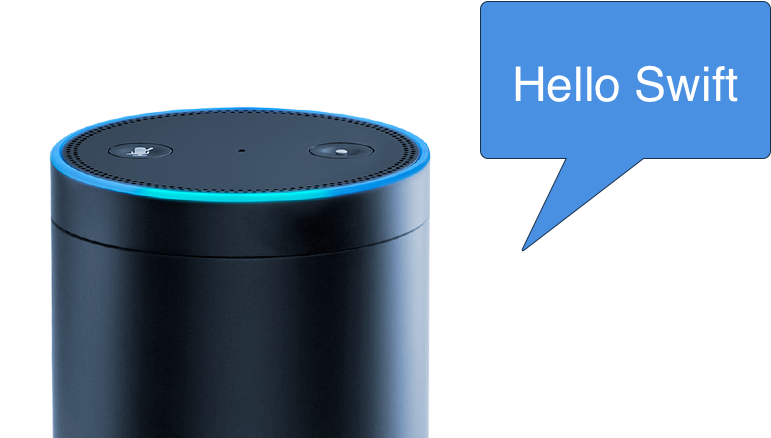choefele / Alexaskillskit
Programming Languages
Projects that are alternatives of or similar to Alexaskillskit
AlexaSkillsKit
AlexaSkillsKit is a Swift library that allows you to develop custom skills for Amazon Alexa, the voice service that powers Echo. It takes care of parsing JSON requests from Amazon, generating the proper responses and providing convenience methods to handle all other features that Alexa offers.
AlexaSkillsKit has been inspired by alexa-app, SwiftOnLambda and alexa-skills-kit-java.
A sample project using AlexaSkillsKit can be found in the swift-lambda-app repo. This project also comes with a detailed description on how to deploy your custom skill. The article Building Alexa Skills in Swift contains a step-by-step introduction on how to use AlexaSkillsKit and swift-lambda-app to publish your own Alexa Skill.
It's early days – expect API changes until we reach 1.0!
Published Skills using AlexaSkillsKit
Music Charts (DE: Musikcharts) is a skill to get to know the most popular songs on Spotify and is published in the US, UK and DE skill stores.
Implementing a Custom Alexa Skill
Start with implementing the RequestHandler protocol. AlexaSkillsKit parses requests from Alexa and passes the data on to methods required by this protocol. For example, a launch request would result in AlexaSkillsKit calling the handleLaunch() method.
import Foundation
import AlexaSkillsKit
public class AlexaSkillHandler : RequestHandler {
public init() {}
public func handleLaunch(request: LaunchRequest, session: Session, next: @escaping (StandardResult) -> ()) {
let standardResponse = generateResponse(message: "Alexa Skill received launch request")
next(.success(standardResponse: standardResponse, sessionAttributes: session.attributes))
}
public func handleIntent(request: IntentRequest, session: Session, next: @escaping (StandardResult) -> ()) {
let standardResponse = generateResponse(message: "Alexa Skill received intent \(request.intent.name)")
next(.success(standardResponse: standardResponse, sessionAttributes: session.attributes))
}
public func handleSessionEnded(request: SessionEndedRequest, session: Session, next: @escaping (VoidResult) -> ()) {
next(.success())
}
func generateResponse(message: String) -> StandardResponse {
let outputSpeech = OutputSpeech.plain(text: message)
return StandardResponse(outputSpeech: outputSpeech)
}
}
In the request handler, your custom skill can implement any logic your skill requires. To enable asynchronous code (for example calling another HTTP service), the result is passed on via the next callback. next takes a enum that's either .success and contains an Alexa response or .failure in case a problem occurred.
Deployment
You can run your custom skill on AWS Lambda using an Alexa Skills Kit trigger as well as on any other Swift server environment via Alexa's HTTPS API. You can use the same RequestHandler code in both cases.
Using Lambda, Amazon will take care of scaling and running your Swift code. Lambda, however, doesn't support Swift executables natively thus you have to package your Swift executable and its dependencies so it can be executed as a Node.js Lambda function.
A stand-alone server allows you to use alternate cloud providers and run multiple skills on the same server using any Swift web framework such as Kitura, Vapor or Perfect. Even if you use Lambda for execution, configuring a server allows you to easily run and debug your custom skill in Xcode on a local computer.
A sample for a custom skill using both deployment methods is provided in the swift-lambda-app project. Please have a look at this sample for step-by-step instructions on how to do this.
Lambda
For Lambda, you need to create an executable that takes input from stdin and writes output to stdout. This can be done with the following code:
import Foundation
import AlexaSkillsKit
import AlexaSkill
do {
let data = FileHandle.standardInput.readDataToEndOfFile()
let requestDispatcher = RequestDispatcher(requestHandler: AlexaSkillHandler())
let responseData = try requestDispatcher.dispatch(data: data)
FileHandle.standardOutput.write(responseData)
} catch let error as MessageError {
let data = error.message.data(using: .utf8) ?? Data()
FileHandle.standardOutput.write(data)
}
In combination with a Node.js wrapper script that calls your Swift executable, this code can be uploaded to Lambda. See the sample project for more details.
Stand-Alone Server
Invocation of a RequestHandler as part of a Swift server is done via Amazon's HTTPS API where the Alexa service calls your server with a POST request. In the following code, Kitura is used as a web framework but any other web framework would work equally well:
import Foundation
import AlexaSkillsKit
import AlexaSkill
import Kitura
router.all("/") { request, response, next in
var data = Data()
let _ = try? request.read(into: &data)
let requestDispatcher = RequestDispatcher(requestHandler: AlexaSkillHandler())
requestDispatcher.dispatch(data: data) { result in
switch result {
case .success(let data):
response.send(data: data).status(.OK)
case .failure(let error):
response.send(error.message).status(.badRequest)
}
next()
}
}
Kitura.addHTTPServer(onPort: 8090, with: router)
Kitura.run()
Again, the sample project contains a detailed description on how to use a local HTTP server for developing your Alexa skill.
Also, you can use the same Swift server on a remote machine as the backend for your custom skill. Please check Amazon's additional requirements for this type of deployment.
Supported Features
Request Envelope
| Feature | Supported |
|---|---|
| version | yes |
| session | yes |
| context | |
| request | partially, see below |
Requests
| Feature | Supported |
|---|---|
| LaunchRequest | yes |
| IntentRequest | yes |
| SessionEndedRequest | yes |
| AudioPlayer Requests | |
| PlaybackController Requests |
Response Envelope
| Feature | Supported |
|---|---|
| version | yes |
| sessionAttributes | yes |
| response | partially, see below |
Response
| Feature | Supported |
|---|---|
| outputSpeech | partially (plain yes, SSML no) |
| card | yes |
| reprompt | yes |
| directives | |
| shouldEndSession | yes |
Other
| Feature | Supported |
|---|---|
| Request handler | yes |
| Account Linking | |
| Multiple Languages | partially (locale attribute supported) |
| Response validation | |
| Request verification (stand-alone server) |

